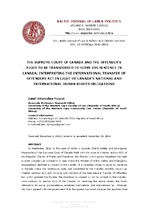The supreme court of Canada and the offender's right to be transfer to serve his sentence in Canada: Interpreting the International transfer of offenders in the light of Canada's National and International Human rights obligations
Abstract
In September 2013 in the case of Divito v Canada (Public Safety and Emergency
Preparedness) the Supreme Court of Canada dealt with the issue of whether section 6(1) of
the Canadian Charter of Rights and Freedoms, the Charter, which grants Canadians the right
to enter Canada was violated in a case where the Minister of Public Safety and Emergency
Preparedness declined to consent to the transfer of a Canadian citizen to serve his sentence
in Canada where the sentencing state had consented to the transfer. Another issue was
whether sections 8(1) and 10(1)(a) and 10(2)(a) of the International Transfer of Offenders
Act, which granted the Minister the discretion to consent or not to consent to the transfer,
were contrary to section 6(1) of the Charter. In resolving the above issues, the Court
referred to its earlier jurisprudence, academic publications and international law. Although
the Court agreed with the government that the appeal was moot because the appellant had left the USA by the time it was heard, it held that it retained “a residual discretion to decide
the merits of a moot appeal if the issues raised are of public importance” and that this case
was one of public importance because “[t]he issues are likely to recur in the future and there
is some uncertainty resulting from conflicting decisions in the Federal Court.” The purpose of
this article is to highlight the interpretative tools invoked by the court and the implications of
the judgement.

